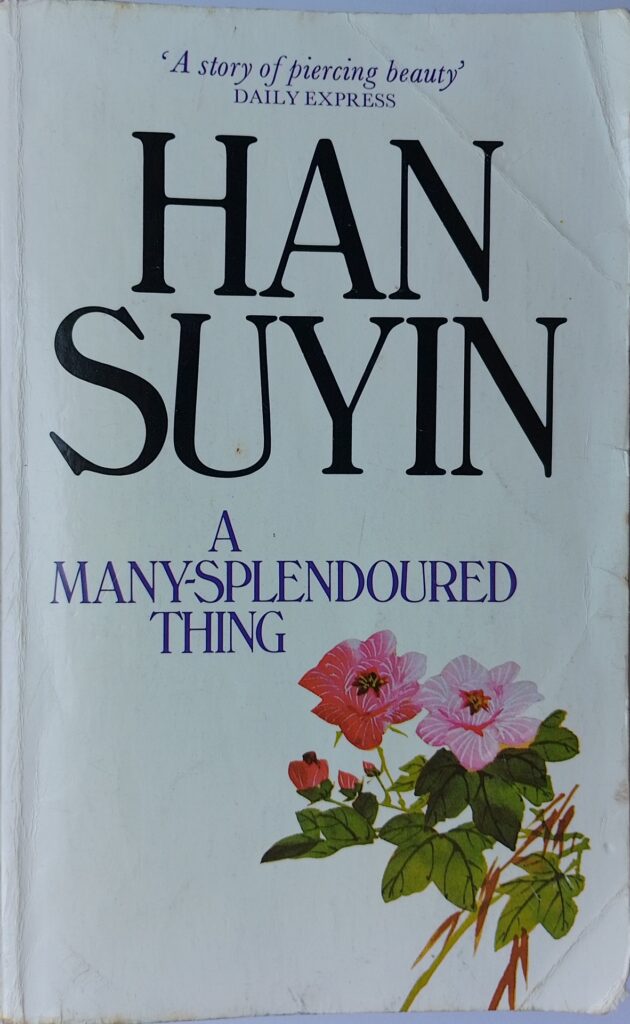First published 1952. Triad Granada paperback, 1985, pp 333, c.135,000 words.
The title of this book sounds like a quote from something, but a search reveals that it is not Shakespeare or any of the other usual sources. Only a song is mentioned and that was written to accompany the film made from this book. Towards the end of the book, the protagonist remembers a poem by Francis Thompson, ‘O World Intangible’, which includes the line, although Wikipedia says it comes from the poem ‘The Kingdom of God’ (N1). That article also says that Thompson was a Catholic mystic, and although both those elements have a minor role in this book it is the song that is where the title comes in: love is a many-splendoured thing.
The book is sold as being the story of a tragic love affair, and the entire plot is given away on the back cover. The love affair is between a Chinese-European doctor, Han Suyin, and an English journalist, Mark. It does provide a semblance of plot, but if you are seeking a simple romance then look elsewhere. The love story, although the feeling of transcendence it gives is powerfully and beautifully evoked, it is actually the least convincing element of the book. The real theme here is the cultural divide between Westerners and Chinese, particularly as experienced in Hong Kong in the late 1940s as the communists were defeating the nationalists in the Chinese civil war.
The story is to a degree autobiographical, the author using her own pen-name for the protagonist – her real name being Rosalie Chou (N2). Similarly the journalist is based on a man the author had a love affair with. Disentangling the autobiographical elements from the fictional would require significant further reading; possible because the author also wrote an acknowledged autobiography of her life during this period (N2).
Although the protagonist feels as though she is discriminated against in Hong Kong because of her mixed-race heritage we are given a sophisticated reading of the clash of cultures. There are no clear goodies and baddies. All sides are a mixture, something laid out in thoughtful, intelligent and subtle detail. Hong Kong was a vibrant entrepot at the time, with floods of refugees, mainly of those fleeing the communist advance. No one expects to remain there: ‘This is the most permanent fact about the Colony: with few exceptions, those who come regard themselves as on the way to somewhere else.’ [p28] Han herself moves back and fourth to China, and Mark is often off to a trouble spot elsewhere or with his wife in Singapore.
The book explores what is happening in China from differing perspectives. Han’s Chinese family is upper middle class, rich by most standards but not landowners. Han was married to a Nationalist officer who was killed in the war (as was the author), so from a number of angles she has much to fear from the communists. Yet she embraces the revolution as a purging of foreign influence over China. She is drawn to embrace the revolution while recognising that she will have to conform. She will have to deny her past and her current love, denounce all that and become a unit of society and no longer an individual, free-thinking human.
The analysis of how the communist revolution came about is laid at the door of Western missionaries. They were the ones who showed that there was a different way from the essentially feudal system still prevailing in China in the nineteenth and early twentieth century: ‘How difficult it must be to become a missionary! In order to convince others, one must be so completely indoctrinated with the superiority of one’s own brand of belief.’ [p21] – which is exactly the model the communists adopted.
The prose is often lyrical, particularly when she is trying to evoke the central love affair: ‘…we watched the scythes of dusk rake gold and emerald and turquoise out of the earth, and witless stars, anonymous heads at a theatre balcony, peer numerous and cold from a vacuous sky.’ [p200] A friend who is dying of tuberculosis has a hallucination of herself transformed into a tree which is another particularly beautiful paragraph [p271].
The structure of the book is mainly a linear narrative, but there are occasional sections which are simply vignettes from the lives of some of the characters. This jars slightly, as though the author had some ideas she wanted to include but failed to work them into the narrative flow. However, they do work, helping to build up a picture of the variety of people present in the entrepot. There are a number of French phrases used which is irritating because my language skills are clearly less than the author’s (she also wrote books in French.) She uses the expressive word ‘gay’ in its old sense, and it is a sad loss that it has been hijacked for another use.
This is a beautifully and intelligently written book. It captures a place and a moment in history with some penetrating insights. Sometimes it is rather equivocal, with an ability to see good and bad everywhere. The protagonist is drawn to China and its cleansing revolution, and yet she sees its excesses and potential for reversion to despotism. In the end she sits on the fence and remains in Hong Kong. The tragic denouement of the love affair is as perfunctory as a wedding tacked on to the end of a Jane Austen novel.
N1: https://en.wikipedia.org/wiki/Francis_Thompson
N2 Wikipedia biography of Han: https://en.wikipedia.org/wiki/Han_Suyin
Wikipedia summary of book: https://en.wikipedia.org/wiki/A_Many-Splendoured_Thing
An insightful obituary: https://www.theguardian.com/books/2012/nov/04/han-suyin
Others’ reviews of the book: https://www.goodreads.com/book/show/702590.A_Many_Splendoured_Thing?ref=nav_sb_ss_1_18
© William John Graham, May 2023

